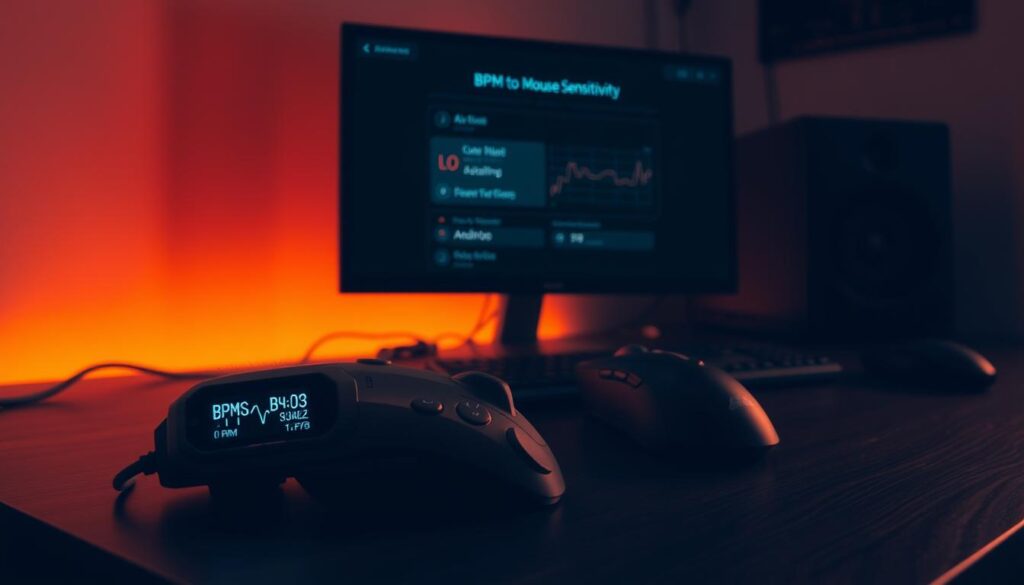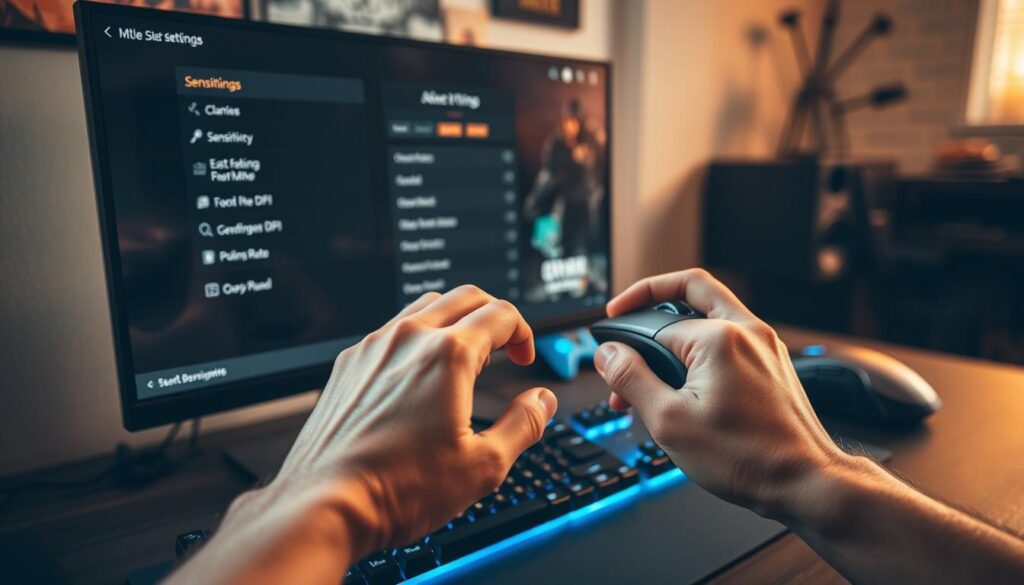Anúncios
Ever thought about how your heart rate affects your aim in first-person shooters? For left-handed players, adjusting mouse sensitivity is more than just tweaking settings. It’s about improving performance based on physical and emotional states.
In a world mostly made for right-handed players, left-handed FPS fans face special challenges. They need to fine-tune their mouse sensitivity even more. Using heart rate data can help improve gaming, letting players sharpen their skills and get that perfect shot.
Anúncios
This article will explore how mouse sensitivity, heart rate, and left-handed gameplay are connected. You’ll learn how these elements work together to enhance your gaming experience.
Understanding Mouse Sensitivity in FPS Games
In FPS games, mouse sensitivity is key for good gameplay. Players need to aim precisely, as small movements can change the game. Knowing how mouse sensitivity works helps gamers improve and enjoy their games more.
Importance of Precision in First-Person Shooters
Precision is crucial in first-person shooters. High-stakes moments require accurate aiming and shooting. With the right mouse sensitivity, players can react fast and hit their targets, giving them an edge in competition. Finding the right balance between speed and precision is essential for perfect gameplay.
Anúncios
Factors Affecting Mouse Sensitivity
Several factors impact mouse sensitivity in FPS games. DPI settings, which control how far the cursor moves, are important for adjusting sensitivity. The polling rate, which shows how often the mouse reports its position, also affects how fast you can move. Personal preferences, like comfort and playing style, also influence the best settings for each player.
The Role of Heart Rate in Gaming Performance
Heart rate is key in gaming, especially in fast-paced games. It affects how well you play, showing how to get better at games. Knowing how heart rate and physical response impact your game can help you improve.
Physical Response and Reaction Time
When you’re excited or stressed while gaming, your heart beats faster. This can make you more alert and quick to react. Being fast can win you games, but too much excitement can make you less precise.
Analyzing Heart Rate as a Performance Metric
Watching your heart rate can tell you a lot about your gaming. It shows when you’re most focused and ready to play. This helps you adjust your game settings to match your body’s response, improving your skills.
Why Left-Handed Players Face Unique Challenges
Left-handed gamers face special challenges that affect their game play. There’s a lack of left-handed mouse designs, leading to discomfort and poor performance. Knowing about mouse ergonomics made for lefties can really help their success in games.
Mouse Design and Ergonomics for Lefties
Left-handed mice are designed differently to fit left-handed gamers better. They offer a more comfortable grip and better control. A good left-handed mouse should match the natural hand position and consider button placement and shape.
But, many makers focus on right-handed designs. This leaves left-handed gamers with few options. This scarcity can cause discomfort and even injuries over time.
Common Misconceptions About Left-Handed Gaming
There are myths about left-handed gamers that can hurt their confidence and game play. Some think left-handed gamers are at a disadvantage because of rare equipment. But, skill is more important than handedness.
Others believe left-handed gamers must change their game play style a lot. These myths can hold them back. But, with better understanding and support, left-handed gamers can overcome these challenges.
Calibrating Mouse Sensitivity using BPM for left-handed players
Using heart rate data to calibrate mouse sensitivity can really improve gameplay for left-handed players. It makes sure the mouse settings match the player’s heart rate. This way, players can interact more precisely during games.
Integrating Heart Rate Data into Mouse Settings
To start, collect BPM metrics during gaming. This data helps find the right sensitivity for each player. Left-handed players can set their mouse to match their heart rate. This makes their gaming feel more natural.
Finding the Sweet Spot: DPI and Sensitivity Adjustments
Finding the right DPI settings is key for a good gaming experience. Left-handed players should try different sensitivity levels. Start with a moderate DPI and adjust slowly, watching your heart rate and performance.

Choosing the Right Gaming Mouse for Left-Handed Players
Finding the right gaming mouse for left-handed players can make a big difference. It improves comfort and boosts gaming skills. Key features include ergonomic design, button placement, and adjustable sensitivity settings. These aspects are crucial for left-handed FPS gamers to succeed.
Features to Look for in a Left-Handed Mouse
When looking for a left-handed gaming mouse, focus on these important features:
- Ergonomic Design: A mouse made for left-handed use prevents discomfort during long gaming sessions.
- Customizable Buttons: Custom button layouts let players set up actions their way, improving gameplay.
- Adjustable DPI Settings: Being able to change DPI settings helps gamers find the right sensitivity for each game.
- Weight Adjustment Options: Changing the mouse’s weight can improve control in fast-paced games.
Popular Gaming Mice for Left-Handed FPS Players
Several mice are popular among left-handed FPS players. They offer features that enhance gaming experiences:
- Logitech G903: This wireless mouse has great performance and design, making quick adjustments easy.
- Razer Naga Left-Handed Edition: It has lots of customization options, great for players who like many programmable buttons.
- Cooler Master MM710: Known for its lightness and comfort, it’s perfect for fast-paced FPS games.
How to Adjust Your Mouse Settings for FPS Games
Getting your mouse settings just right can really boost your FPS gaming. Left-handed players can make big improvements by tweaking their settings through special software. This lets them calibrate their mouse sensitivity to fit their personal style.
Using Manufacturer Software for Accurate Calibration
Most gaming mice come with software to help you tweak your settings. Here’s how to get the best calibration:
- First, download and install the software from the mouse maker, like Logitech G HUB, Razer Synapse, or SteelSeries Engine.
- Then, plug in your mouse and open the software.
- Look for the settings menu. You’ll find options for adjusting your mouse settings there.
- Change the DPI (dots per inch) to tweak your sensitivity. Higher DPI means faster movement but needs more precision.
- Save your changes and test them out in practice mode or during a game.
Recommended Sensitivity Settings for Left-Handers
Left-handed players can find the perfect sensitivity settings for better gameplay. Here are some common suggestions:
| DPI Setting | In-Game Sensitivity | Recommended Use |
|---|---|---|
| 400-800 DPI | 1.0-2.0 | Precise aiming and control |
| 800-1600 DPI | 2.0-3.0 | Balanced approach for versatile gameplay |
| 1600 DPI and above | 3.0+ | Fast-paced situations and quick reflexes |
By fine-tuning these settings with the manufacturer’s software, left-handed players can see a big jump in their FPS game performance. They can find the perfect mix of speed and accuracy.

Testing Your Settings: Trial and Error
Perfecting mouse sensitivity is a journey of trial and error. Adjustments need constant checking and tweaking. Aim practice maps are key tools for this, helping players test their aim in a controlled space.
Using Aim Practice Maps for Calibration
Aim practice maps help players see how they do with different sensitivity settings. These maps offer drills that focus on aiming and quick reflexes. It’s important to try out different sensitivity levels to find what works best.
Players should watch how fast they can adjust their aim and how accurate they are. This helps them understand how their mouse settings affect their gameplay.
Adapting to Changes in Sensitivity
When sensitivity changes, adjusting gameplay is crucial. Players need to practice and adjust to feel comfortable with new settings. This process takes patience, as small changes can make a big difference.
Regular practice in aim maps helps refine new sensitivity levels. It also builds muscle memory, improving reaction times and making gameplay smoother.
The Impact of Polling Rate on Gaming Performance
The polling rate of a gaming mouse greatly affects its speed and performance in FPS games. It’s how often the mouse tells the computer where it is. A higher polling rate means better tracking and less lag, which is key for fast-paced games.
Understanding Polling Rate Metrics
Polling rates are measured in Hertz (Hz), showing how often a mouse updates its position. You’ll see 125 Hz, 500 Hz, and 1000 Hz rates. For top FPS gaming, 1000 Hz is best. It means only a millisecond of delay between updates, keeping gameplay smooth.
Optimal Polling Rates for Competitive Play
The right polling rate can really change how you play. While 125 Hz is okay for casual games, serious FPS players prefer higher rates. Rates of 500 Hz or 1000 Hz improve response times, letting players react faster. For tips on setting up your mouse, check out this useful resource.
| Polling Rate (Hz) | Update Frequency (ms) | Suitable For |
|---|---|---|
| 125 | 8 | Casual Gaming |
| 500 | 2 | Competitive Play |
| 1000 | 1 | Professional FPS Gaming |
Knowing about polling rates helps gamers improve their game. It’s all about making the right choice for better performance.
Creating a Comfortable Gaming Environment
Creating a comfy gaming space is key for better gaming, especially for left-handed players. A good desk setup and the right mousepad are crucial for comfort during long gaming times.
Desk Setup and Mousepad Choices
Start with the desk setup. Make sure the monitor is at eye level to avoid neck pain. A big desk lets you move freely, which is important for good gaming.
Choosing the right mousepad is also key. It affects how fast and well you can move in games. For left-handed players, a mousepad that fits their grip and tracking needs is best.
Minimizing Physical Discomfort During Gameplay
Being physically comfortable is key to avoid getting tired and stay focused. Use ergonomic chairs to support your back and prevent aches during long gaming times.
Take breaks often to avoid strain. Adding these elements to your gaming space makes gaming more enjoyable and immersive.
Learning from the Pros: Sensitivity Insights
Professional left-handed players share their secrets on sensitivity settings and equipment. Their insights help others improve in competitive games. Learning from them can boost your skills, especially if you’re left-handed in first-person shooters.
What Professional Left-Handed Players Use
Left-handed pros use specific sensitivity settings for better precision. They often mix low DPI with high sensitivity for control. This combo helps with complex moves.
Translating Pro Tips to Your Gameplay
Adopting pro tips can enhance your gameplay. It’s key to adjust sensitivity settings based on how you feel and perform. Try different setups and note what works for you. Following pros’ advice leads to better performance in FPS games.
Conclusion
Calibrating mouse sensitivity is key for better FPS performance, especially for left-handed gamers. They often face special challenges. By adjusting mouse settings based on heart rate, players can get a more precise gaming experience.
Understanding how heart rate affects gaming helps left-handed players tailor their setups. This way, they can meet their unique needs better.
This article showed how important mouse sensitivity calibration is for left-handed gamers. Using heart rate metrics helps find the perfect sensitivity for each player. This not only boosts accuracy but also makes gaming more fun.
Left-handed gamers should work on improving their gaming by using these tips. By focusing on personalized settings and heart rate, they can get better at FPS games. This makes their gaming sessions more enjoyable and effective.





